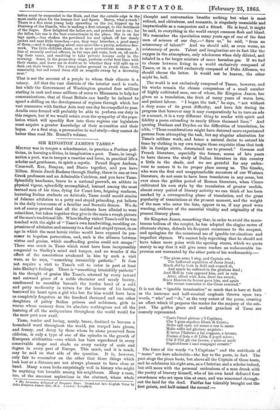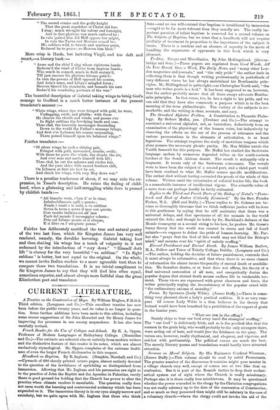SIR KINGSTON JAMES'S TASSO.*
MILTON was in temper a schoolmaster, in practice a Puritan poli- tician, in learning a divine, in imagination a poet. Tasso, in imagi- nation a poet, was in temper a courtier and lover, in practical life a scholar and gentleman, in spirit a mystic. Pound Roger Aschatn, Cromwell, Ken, Bunyan, and Dante together, and you have Milton. Strain Jacob Boehme through Shelley, throw in one or two Greek professors and an Admirable Crichton, and you have Tasso. Splendidly handsome, brave to a national proverb, an athlete in physical vigour, splendidly accomplished, learned among the most learned men of his time, dying for Court love, feigning madness, lecturing Italian students on Aristotle, Tasso could mould strains of fulsome adulation to a petty and stupid princeling, yet believ.e in the daily intercourse of a familiar and Socratic demon. We do not of course pretend that all the incidents here alluded to were coincident, but taken together they give in the main a rough picture of the man's traditional life. When Shelley visited Tasso's cell he was touched with the sight of "Tasso's own handwriting, moulding ex- pressions of adulation and entreaty to a deaf and stupid tyrant, in an age in which the most heroic virtue would have exposed its pos- sessor to hopeless persecution, and, such is the alliance between virtue and genius, which unoffending genius could not escape !" There was much in Tasso which must have been inexpressibly congenial to Shelley's mind and temper, and no wonder if the effect of the associations awakened in him by such a visit were, as he says, "something irresistibly pathetic." It does not require a visit to Tasso's cell to enter in part at least into Shelley's feelings. There is "something irresistibly pathetic" in the thought of genius like Tasso's, adorned by every inward and outward grace of a noble character and manly beauty, condemned to smoulder beneath the leaden hand of a cold and petty mediocrity in return for the honour of his having bestowed his heart upon a girl who but for him would have been as completely forgotten as the hundred thousand and one other daughters of paltry Italian princes and noblemen, girls to rescue whose memory from its absolute nothingness not all the learning of all the antiquarians throughout the world would for the most part now avail.
Tasso, tender and loving, manly, brave, destined to become a household word throughout the world, yet warped into gloom, and frenzy, and decay by those whom he alone preserved from oblivion, is only a type of one of the episodes in the growth of European civilization—one which has been reproduced in every conceivable shape and shade on every variety of scale and degree in every part of Europe. This much, and it is much, may be said on that side of the question. It is, however, only fair to remember on the other that those things which look best at a distance are not always pleasant to have close at hand. Many a man looks surprisingly well in history who might be anything but loveable among his neighbours. Many a man, too, of the sincerest aspirations in the abstract, whose whole
• The Jerusalem Delivered of Torquato Tasso. TransIsted into English Verse by Johu Kingston James, Keit., M.A. London: Longmon.
thought and conversation breathe nothing but what is most refined, and chivalrous, and romantic, is singularly unamiable and impracticable as a companion and a friend. He is loyal, it might be said, to everything in the world except common flesh and blood. We remember the ejaculation many years ago of one of the first men of science of our day,—" Save us," he said, "from an aristocracy of talent!" And we should add, as even worse, an aristocracy of poets. Talent and imagination are in fact like the oxygen in the atmosphere, only wholesome when duly diluted, and inhaled in a far larger mixture of more harmless gas. If we had to choose between living in a world exclusively composed of Tassos, or in a world exclusively composed of Duke Alfonsos, we should choose the latter. It would not be heaven, the other might be, hell.
The world is not exclusively composed of Tassos, however, and his wbrks remain the chosen companions of a small number of highly cultivated men, one of whom, Sir Kingston James, has given us a translation, the fruit of many years of warm love, and patient labour. "I began the task," he says, "not without a deep sense of its great difficulty, and have felt during its progress that however easy it may comparatively be to turn an ode or a sonnet, it is a very different thing to render with spirit and fidelity a poem extending to nearly fifteen thousand lines." And quoting Denham and Dryden on the difficulties of translation, he adds, "These considerations might have deterred more experienced persons from attempting the task, but my singular admiration for Tasso's sublime work, and hence a natural, desire to extend his fame by clothing in my own tongue those exquisite ideas that took life in foreign attire, determined me to proceed." German and French literature, especially the former, seems of late years to have thrown the study of Italian literature in this country a little in the shade, and we are grateful for any endea- vour to restore it to its proper place among us. The Greeks, who were the first and unapproachable ancestors of our Western literature, do not seem to have been translators in any sense, but ever since the golden period of Roman literature, when Cicero cultivated his own style by the translation of greater models, almost every period of literary activity we can think of has been marked by a corresponding phase of translation, and the great popularity of translations at the prNent moment, and the weight of the men who enter the lists, appear to us, if any proof were wanting, evidence of the essential vitality and originality of the present literary phase.
Sir Kingston James, remarking that, in order to avoid the mono- tonous tedium of the couplet, he has adopted the elegiac metre of alternate rhyme, defends his frequent recurrence to the anapant, and apologizes for the occasional use of ignoble terminations and imperfect rhymes. We cannot help regretting that he should not have taken more pains with the opening stanza, which we quote merely to say that it will give some readers an unfavourable im- pression not warranted by the other parts of his workmanship :—
" The pious arms I sing, and Captain who The hallowed sepulchre of Jesus freed; Much did he both in field and council do, And much he suffered in the glorious deed ; And Hell in vain opposed him, and in vain Alvin, allied with Asia, drew the sword ; Since Heaven its favour gave him, and again His errant comrades to the Cross restored."
It is not the "ignoble termination" so much that is here at fault as the immense and half-comical emphasis thrown upon two words, "who" and "do," at the very outset of the poem, creating an effect which ill prepares the reader for the majesty of the sub- ject. The golden grace and modest grandeur of Tasso are scarcely represented.
"Canto Parini pie lose e '1 Capitano, Che '1 gran sepolcro liberb di Cristo ; Molto egli °pro col senno e con la mano • Molto soffri nel glorioso acquisto : E invan l'Inferno a lui s'oppose, e iuvano, S'armb &Asia e di Libia il popol misto ; Che ii Ciel gli ebb favore, e sotto ai santi Segni ridwme i suoi compagni erranti."
The force of the words "e 'I Capitano " and the antithesis of " mano " are here admirable—the key to the poem, in fact. The poet sings the pious hosts, but above all the Captain of those hosts, and he celebrates his right arm, as a Christian and a scholar indeed, but still more with the personal enthusiasm of a man drunk with the poetry of bravery himself, who of his own hand defeated four swordsmen who set upon him at once, and was renowned through- out the land for the deed. Fairfax has tolerably brought out the fast points, and half-missed the second :—
"The sacred armies and the godly knight That the great sepulchre of Christ did free I sing ; much wrought his valour and foresight,
And in that glorious war much suffered he : In vain 'gainst him did Hell oppose her might,
In vain the Turks and Morians armed be ; His soldiers wild, to brawls and mutines prest, Reduced he to peace ; so Heaven him blest."
More crisp is Hoole, but imitating Virgil, and too deft and smartb—a literary back :— "Arms and the chief I sing whose righteous hands Redeem'd the tomb of Christ from impious bands ; Who much in council, much in field sustain'd, Till just success his glorious labours gain'd In vain the powers of Hell opposed his course, And Asia's arms, and Libya's mingled force ; Heaven bless'd his standards, and beneath his care Reduc'd his wandering partners of the war."
The beautiful description of Gabriel taking wings to brifig God's message to Godfred is a much better instance of . the present translator's manner :—
" White wings, whose tips were fringed with gold, he wore,
Unflagging, swift, and pliable : with these He cleaves the clouds and winds, and passes o'er In flight sublime the low-lying lands and seas.
Thus clad, the heavenly messenger descending Down to the world the Father's message brings, And first o'er Lebanon his course suspending, There poised himself upon his balanced wings."
Fairfax translates :— " Of silver wings he took a shining pair,
Fringed with gold, unwearied, nimble, swift ; With these he parts the winds, the clouds, the air, And over seas and earth himself doth lift; Thus clad, he cut the spheres and circles fair, And the pure skies with sacred feathers clift, On Libanon at first his foot he set, And shook his wings, with rory May dews wet."
There is a peculiar tenderness of sheen, if we may coin the ex- pression, in Tasso's description. He raises the feeling of child- hood, when a glistening, and half-struggling white dove is pressed by childish hands :—
" Ali blanche vesti, c'han d' or le cime, Infaticabilmente agili e preste
Fends i venti e le nubi, e va sublime Sovra la terra e sovra il mar con queste.
Cosi vestito indirizzossi ime Parti del mondo il messaggier celeste : Pria sul Libano monte ei si ritenne, E si libro su adeguate penne."
Fairfax has deliberately sacrificed the true and natural poetry of the two last lines, which Sir Kingston James has very well rendered, namely, the dovelike hovering. Gabriel taking foot and then shaking his wings has a touch of vulgarity in it not redeemed by the introduction of " rory dews." "Himself doth lift" is clumsy for the very beautiful " va sublime." "In flight sublime' is better, but not equal to the original. On the whole, we cannot invite Italian readers to a more agreeable task than to compare these two translations. It is no trivial compliment to Sir Kingston James to say that they will find him often equal, sometimes superior, and almost always more faithful than the great Elizabethan poet and translator.



































 Previous page
Previous page